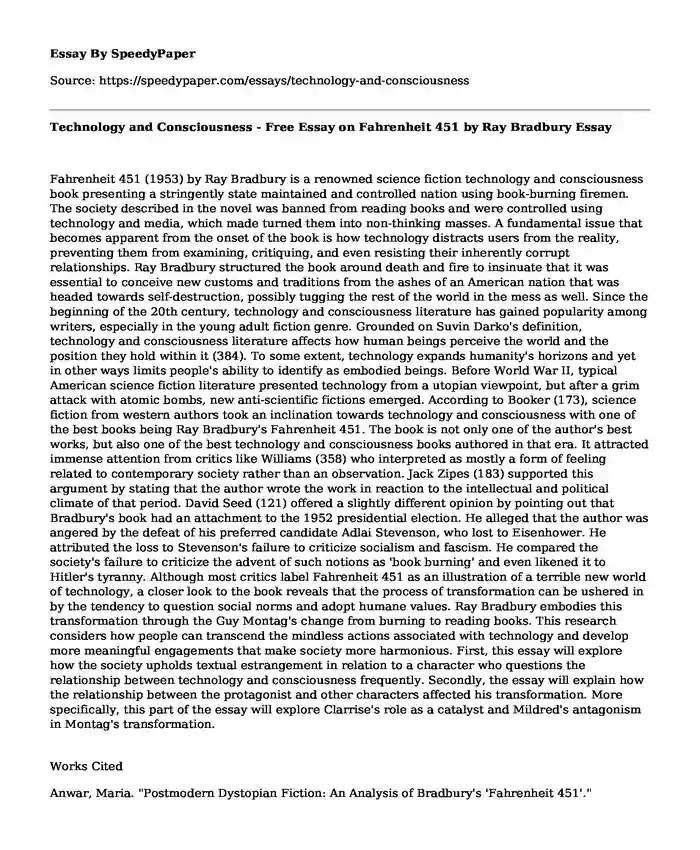
| Type of paper: | Research paper |
| Categories: | Ray Bradbury Fahrenheit 451 |
| Pages: | 3 |
| Wordcount: | 681 words |
Fahrenheit 451 (1953) by Ray Bradbury is a renowned science fiction technology and consciousness book presenting a stringently state maintained and controlled nation using book-burning firemen. The society described in the novel was banned from reading books and were controlled using technology and media, which made turned them into non-thinking masses. A fundamental issue that becomes apparent from the onset of the book is how technology distracts users from the reality, preventing them from examining, critiquing, and even resisting their inherently corrupt relationships. Ray Bradbury structured the book around death and fire to insinuate that it was essential to conceive new customs and traditions from the ashes of an American nation that was headed towards self-destruction, possibly tugging the rest of the world in the mess as well. Since the beginning of the 20th century, technology and consciousness literature has gained popularity among writers, especially in the young adult fiction genre. Grounded on Suvin Darko's definition, technology and consciousness literature affects how human beings perceive the world and the position they hold within it (384). To some extent, technology expands humanity's horizons and yet in other ways limits people's ability to identify as embodied beings. Before World War II, typical American science fiction literature presented technology from a utopian viewpoint, but after a grim attack with atomic bombs, new anti-scientific fictions emerged. According to Booker (173), science fiction from western authors took an inclination towards technology and consciousness with one of the best books being Ray Bradbury's Fahrenheit 451. The book is not only one of the author's best works, but also one of the best technology and consciousness books authored in that era. It attracted immense attention from critics like Williams (358) who interpreted as mostly a form of feeling related to contemporary society rather than an observation. Jack Zipes (183) supported this argument by stating that the author wrote the work in reaction to the intellectual and political climate of that period. David Seed (121) offered a slightly different opinion by pointing out that Bradbury's book had an attachment to the 1952 presidential election. He alleged that the author was angered by the defeat of his preferred candidate Adlai Stevenson, who lost to Eisenhower. He attributed the loss to Stevenson's failure to criticize socialism and fascism. He compared the society's failure to criticize the advent of such notions as 'book burning' and even likened it to Hitler's tyranny. Although most critics label Fahrenheit 451 as an illustration of a terrible new world of technology, a closer look to the book reveals that the process of transformation can be ushered in by the tendency to question social norms and adopt humane values. Ray Bradbury embodies this transformation through the Guy Montag's change from burning to reading books. This research considers how people can transcend the mindless actions associated with technology and develop more meaningful engagements that make society more harmonious. First, this essay will explore how the society upholds textual estrangement in relation to a character who questions the relationship between technology and consciousness frequently. Secondly, the essay will explain how the relationship between the protagonist and other characters affected his transformation. More specifically, this part of the essay will explore Clarrise's role as a catalyst and Mildred's antagonism in Montag's transformation.
Works Cited
Anwar, Maria. "Postmodern Dystopian Fiction: An Analysis of Bradbury's 'Fahrenheit 451'." International Journal 4.1 (2016): 246-249.
Bloom, Harold, ed. Ray Bradbury. Infobase Publishing, 2010.
Booker, M. Keith. "Science Fiction and the Cold War". A Companion to Science Fiction. Ed. David Seed. Malden (Mass.): Blackwell Publishing, 2005. 171-184. Print.
Seed, David. Ray Bradbury. Urbana: University of Illinois Press, 2015. Modern Masters of Science Fiction. eBook Collection (EBSCOhost). Web. 22 Feb 2017.
Suvin, Darko. Defined by a Hollow: Essays on Utopia, Science Fiction and Political Epistemology. Eds. Raffaella Baccolini, Joachim Fischer, Michael J. Griffin, and Tom Moylan. Oxford: Peter Lang, 2010.
Williams, Raymond. "Science fiction." Science Fiction Studies(1988): 356-360.
Zipes, Jack. "Mass Degradation of Humanity and Massive Contradictions in Bradbury's Vision of America in Fahrenheit 451". No Place Else: Explorations in Utopian and Dystopian Fiction. Eds. Eric S. Rabkin, Martin Harry Greenberg, and Joseph D. Olander. Carbondale, Ill: Southern Illinois University Press, 1983. eBook Collection (EBSCOhost). Web. 20 Feb. 2017.
Cite this page
Technology and Consciousness - Free Essay on Fahrenheit 451 by Ray Bradbury. (2022, Feb 21). Retrieved from https://speedypaper.net/essays/technology-and-consciousness
Request Removal
If you are the original author of this essay and no longer wish to have it published on the SpeedyPaper website, please click below to request its removal:
- The Next Generation Petrol Technical Professionals, Free Essay
- Applying Assessment and Health Education Skills, Free Essay Sample
- Cultural Competence in Organizations - Free Essay for You
- Free Essay Analyzing an Artwork from the Metropolitan Museum
- Essay Sample about Qatar Plastic Products Company and Total Quality Management
- Zen in Japanese Buddhism, Free Essay in Religion
- Paper Example: Multi-Agency Meeting
Popular categories




